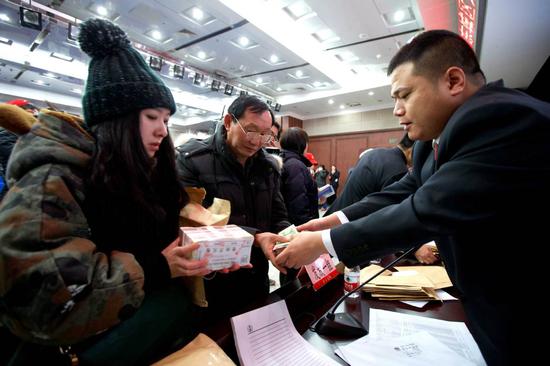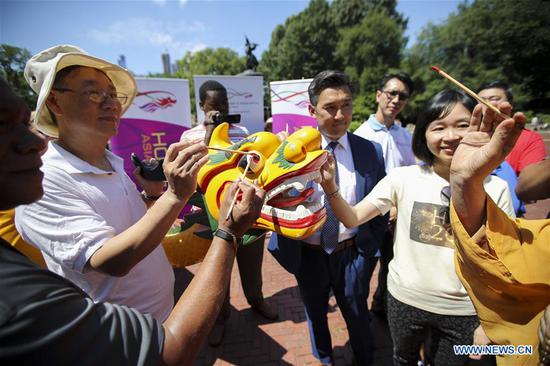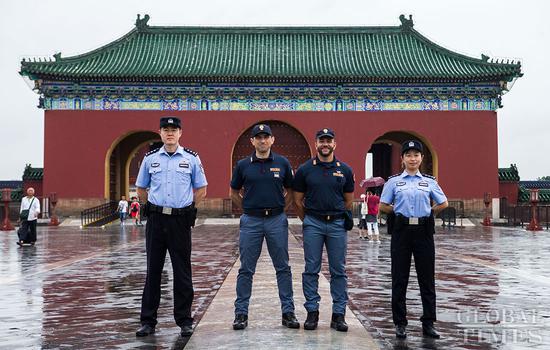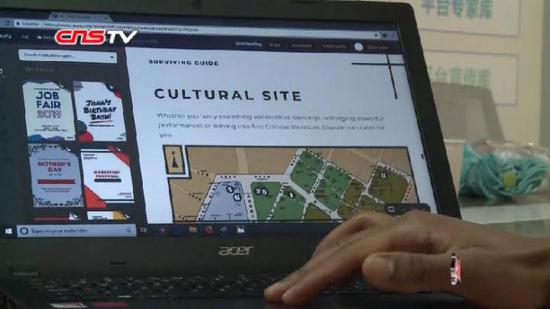
Wang Xiangjie, a judge from Dongcheng District People's Court, returns assets to people who have applied to settle their debts. (Photo/CHINA DAILY)
Measures to compel guilty parties to comply with verdicts are making their mark.
Judge Wang Xiangjie could barely contain his excitement last week when a debtor who had defied a repayment order made by Wang's court six months ago finally paid the 400,000 yuan ($60,000) he owed.
However, the defaulter only agreed to pay his debt after being refused tickets for a flight from Kunming, Yunnan province, to Beijing. The travel agency refused to sell the man the tickets because Wang had imposed a nationwide ban that prevented him from purchasing luxury goods such as air travel or high-speed rail services.
"He could afford to pay the debt but he refused to comply with the verdict," said Wang, who has worked for the enforcement department of Dongcheng District People's Court in Beijing for eight years. "My job is to encourage defaulters to obey court orders."
He added that if the ban on luxury goods doesn't prompt a defaulter to comply with the court's verdict, they will be "named and shamed" on a national blacklist online.
Wang praised the blacklist and the ban - both implemented by the Supreme People's Court, the nation's top judicial body - and said the pressure they bring to bear has played a major role in forcing defaulters to comply with verdicts and repay their debts.
The online blacklist was set up in October 2013 to publish the personal details, such as names and ID card numbers, of individuals and legal representatives of companies who ignored court rulings to shame them into complying.
A year later, the top court established a joint platform with banks, financial institutes and government departments, such as the Ministry of Transport and the Ministry of Public Security, to compel defaulters to comply with verdicts by placing restrictions on their daily lives and preventing them from gaining promotion at work.
"Our aim is to push defaulters to abide by the law, help people to avoid the risks posed by dishonest businesses or individuals, and improve the nation's social credit system," said Meng Xiang, head of the enforcement department at the Supreme People's Court.
He added that 2.8 million defaulters have complied with court orders after being placed on the blacklist.
By the end of June, the details of 11.23 million violations of court orders had been posted online, while defaulters had been prevented from taking 12.22 million flights and 4.58 million rail journeys, according to statistics released by the top court.
Li Jinlei, a judge at Chaoyang District People's Court in Beijing, said the list's success should be attributed to the platform that connects judges and judicial officers to banks so they can identify and seize assets owned by defaulters.
Responsibility and challenge
Wang, from the court in Dongcheng, said he feels a great sense of achievement from apprehending people who use every available method to avoid adhering to court rulings.
"It's both a responsibility and a challenge for me," he said. However, he stressed that the courts only blacklist people who are able to pay but refuse to do so, and do not shame those who lose lawsuits but have no redeemable assets that can be used to raise funds.
Last year, he concluded a long-running case in which an investment company had ignored a large debt. In 2009, the court in Dongcheng ordered the company to pay a plaintiff 2 million yuan, but it avoided paying by regularly changing its phone number, relocating its offices and frequently switching bank accounts.
Though court documents showed that the company was based in a room in a hotel in Beijing, it could not be traced.
"No one opened the door when I visited the room," said Wang, who was the third judge to handle the case.
The trail went cold for a while until one day Wang saw a recruitment notice and phone number the company had posted online.
"I was lucky because someone answered the phone," he said. "However, when I asked the woman where they were located, she refused to say."
When he hung up, Wang called 114, the number for directory assistance, and was told the phone number was still registered at the hotel. He immediately headed for the hotel, and after negotiating with members of staff he was taken to a room on a floor that was under repair and supposedly unoccupied.
When he entered the room and explained who he was, the company's employees were shocked, especially the woman who had answered the phone.
"They never thought a judge could find them through such a tiny advert," Wang said, adding that the company quickly paid its debt.
"We never stop tracing those who ignore court rulings and identifying their assets, because it's our duty to uphold justice."


















































